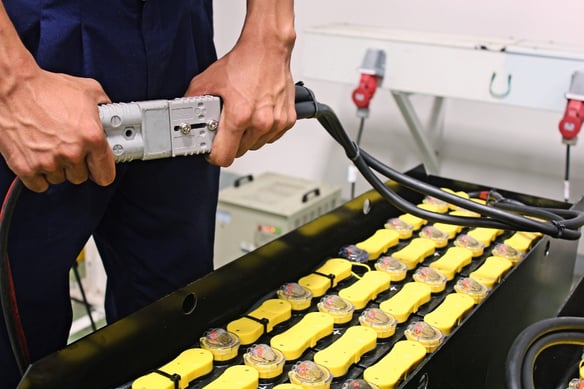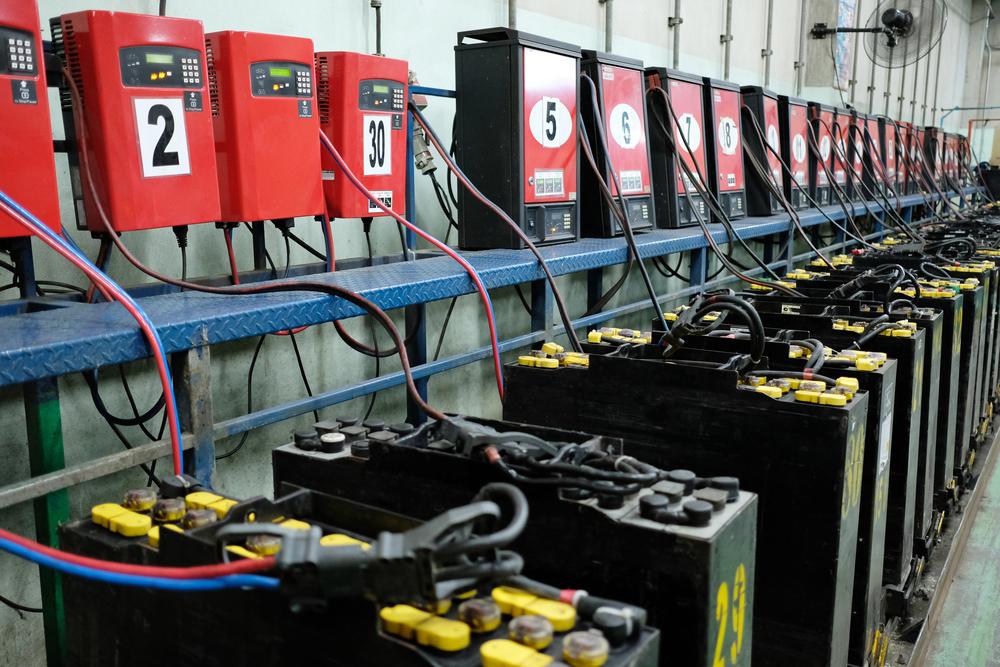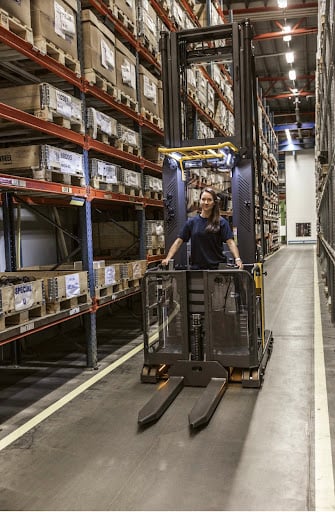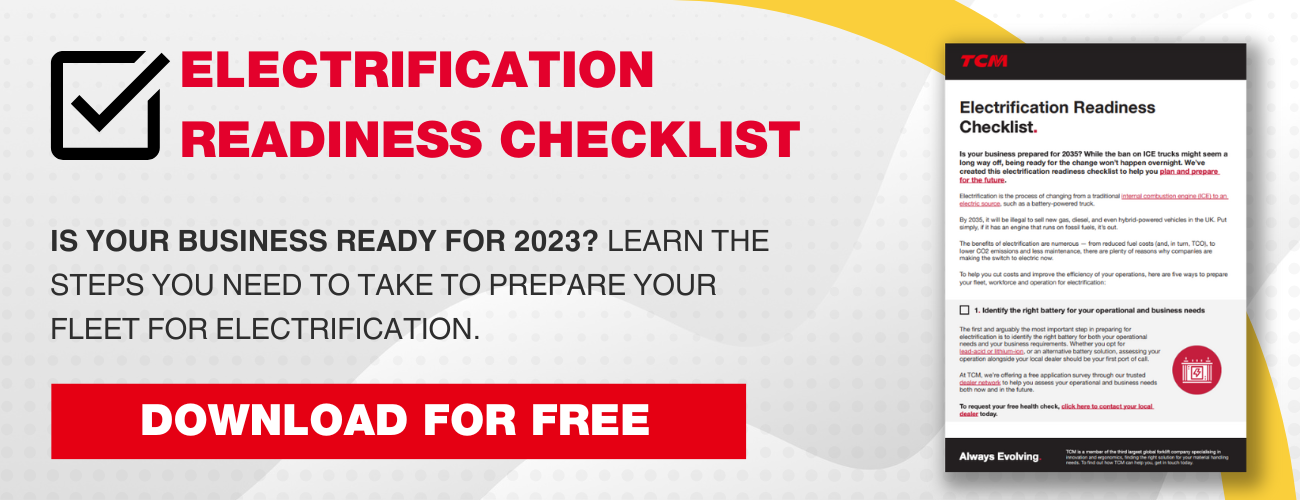Share Article

Maintain your machines
Maintaining your electric forklift fleet is essential to ensure the longevity of your equipment, maximise uptime and keep costs down. Read on to discover the top five electric forklift maintenance tips you need to know.
Optimising forklift maintenance across your fleet is essential to ensure the longevity of your equipment, maximise uptime and keep costs down. In this article, we explore the top five lift truck maintenance tips you need to know for electric and engine-powered equipment.
While electric forklifts have a higher acquisition cost than their gas and diesel counterparts, they can both help your business significantly reduce its total cost of ownership (TCO) in the long run.
However, to secure these cost savings, it’s vital to ensure your machines are kept in optimal working condition — keeping forklift maintenance costs as low as possible
Read on to discover the top five forklift maintenance tips to maximise the value of your equipment both now and for the future.
1. Identify your forklift maintenance goals
Understanding your safety and maintenance priorities and setting a clear plan and schedule will help you keep on track with essential upkeep. Many larger fleet operators will already have maintenance schedules in place, but these need to
.png?width=976&height=662&name=Screenshot%202024-04-10%20at%2014.26.52%20(wecompress.com).png)
It's recommended that forklifts are usually serviced at least every 6 months. For engine-based forklift trucks, the standardisation and similarity of parts to cars mean that the trucks are often easily repaired in-house. Whereas for an electric forklift service, you'll find that your truck and its battery have warranties that require service by an authorised engineer. Knowing your trucks and the services they require ensure you can keep your fleet up to date and in line with your warranty, since failing to carry them out can invalidate it.
On a daily basis, there are regular maintenance processes that need to be followed to protect equipment and maximise uptime. At TCM, we provide a lift truck maintenance contract as part of the finance package across all of our trucks and your dealer will handle warranty claims).
2. Protect the power supply
Forklift operators should carry out daily checks to ensure their forklifts are safe to drive. For engine-powered vehicles, forklift maintenance of the power supply is quite intuitive. If your truck runs out of fuel, your operator refuels and there is no downtime before getting back to work. Monthly, you will want to carry out lift truck maintenance like changing engine oil, cleaning the air filter and lubricating the chassis.
.png?width=954&height=596&name=Screenshot%202024-04-10%20at%2014.32.21%20(wecompress.com).png)
Electric forklift services require regularly checking, cleaning and charging the battery as part of that routine, along with checking the electrolytes. Ensuring electrolyte levels are adequate avoids sulphation of the plates, which can otherwise reduce battery capacity and cause damage over time.
Cleaning batteries regularly is essential to remove any build-up of dust or dirt, which can damage the battery and reduce its lifespan.
When charging, batteries shouldn't be unplugged before this is complete. Like many aspects of electric forklift maintenance, you may not see the effects immediately, but unplugging too early actually chips away at the life of the battery. Once fully charged, you will need to ensure that the batteries are topped up with deionised or distilled water to the correct level.
Related Read: Lead-Acid or Lithium-Ion: What’s Powering Your Warehouse?
3. Prepare for periods of downtime correctly
If you're likely to have a period of closure or a quieter period with fewer trucks in use, there are some key measures to take to protect your equipment.
For both engine-powered and electric forklift trucks, you should check the vehicles for damage and fix any issues before downtime to reduce the risk of breakdown when starting back up.
As part of your forklift maintenance plan, you should store your forklift trucks in a cool, dry environment to minimise disintegration of parts and oil overheating in engine-powered vehicles. What’s more, for engine trucks, you want to try and use up as much fuel as possible before downtime so that fuel is fresh on your return. Other level checks like coolant, engine oil and tyres should be carried out and topped up where necessary to reduce system damage during downtime.
For electric forklifts, be sure to top up the battery fluid to the correct level before disconnecting batteries/trucks from the mains supply to prevent the battery discharging. Batteries should never be allowed to discharge to less than 20% since they risk irreparable damage. If possible, avoid leaving the forklift inactive for long periods to reduce electric forklift repair. You'll usually refresh-charge batteries regularly, but you'll definitely need to charge batteries periodically to maintain optimal condition. Your TCM dealer will be able to advise you on this.

Related Read: Forklift Charging Station Power Requirements Explained
investing in these maintenance and safety measures before a period of downtime will help to extend the life of your fleet and ensure you can hit the ground running when you come back.
Thinking of making the move to electric? Complete our Electrification Readiness Checklist today to help you consider your options and plan for the future.
4. Invest in staff training
A top tip for protecting your investment is to ensure that your staff know how to look after your forklift fleet.

The right training is key to keeping your workforce safe and machines maintained, but it's also a great motivator: understanding the equipment can make operators feel more responsible and take better care of it. Empower your drivers by operating a “if it doesn’t look right, report it” policy and ensuring they know who to turn to if they notice a problem.
Training operators to perform regular inspections can help your business to save money while also identifying any potential safety concerns. This can reduce accidents and downtime to ultimately promote fleet longevity and operational efficiency.
5. Utilise the expertise of your local TCM dealer
Whether you’re in need of an electric forklift service or want advice on your engine-powered fleet, your TCM dealer is on hand to help optimise and personalise your forklift maintenance services all year round.
Contact your dealer to devise a tailored plan and schedule regular forklift servicing and maintenance, helping your business to prevent breakdowns, maximise uptime and keep costs low.
Whether your fleet is powered by electric or engine forklift trucks, discover our Electrification Readiness Checklist to help you achieve your forklift maintenance goals.

.png?width=50)


